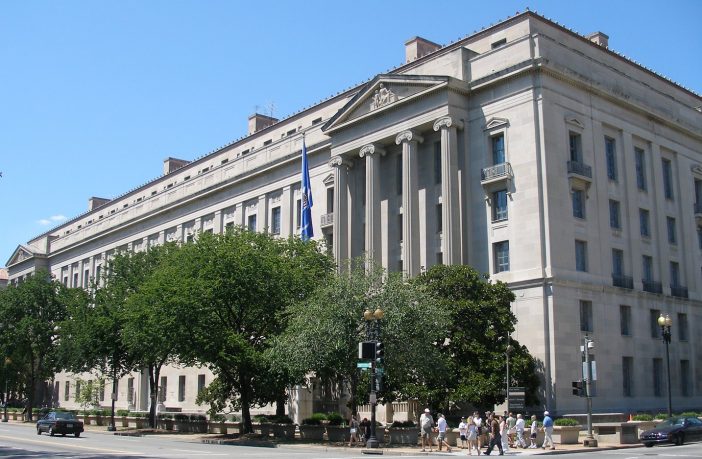Attorney General William Barr gave notice on Monday that the Justice Department would be taking a set actions which “represent significant escalation” of existing efforts “to confront the resistance” of jurisdictions that limit cooperation with Immigration and Customs Enforcement (ICE). In remarks to the National Sheriffs Association conference, Barr reported that earlier that day the DOJ had filed lawsuits against New Jersey and King County, Washington, over sanctuary policies they’ve adopted.
For several weeks, the DOJ and ICE have been escalating its anti-sanctuary actions, including using what is the preferred means of anti-enforcement advocates – lawsuits. The Justice Department sued California in January after the passage of a state law, AB 32, which would prohibit “any individual or entity from operating private detention facilities” in the state. Last week, DOJ followed up with a motion to prevent the continued implementation of the law.
“California, of course, is free to decide that it will no longer use private detention facilities for its own state prisoners and detainees. But it cannot dictate that choice for the United States,” the government said in the Feb. 5 motion, which is just the latest filing in a years-long battle with the Golden State.
Before laying out the full range of the department’s future endeavors, Barr made clear what he meant by “sanctuary policies” and who was being targeted.
“These policies are not about people who came to our country illegally but have otherwise been peaceful and productive members of society. Their express purpose is to shelter aliens whom local law enforcement has already arrested for other crimes. This is neither lawful nor sensible,” stated Barr.
And sanctuary politicians grew more obstinate, which is what has necessitated the energized effort by DOJ and other agencies.
“To the contrary, politicians in sanctuary jurisdictions have become even more aggressive in their attempts to interfere with federal immigration law, going beyond their refusal to share information and facilitate jail transfers,” the attorney general argued.
In addition to filing more lawsuits, the DOJ will initiate a review of the policies of sanctuary cities nationwide to determine if they are breaking federal laws prohibiting the “harboring or shielding of aliens in the United States.” The DOJ will continue to prioritize jurisdictions that assist ICE when disbursing money from discretionary grant programs, as well as offering support to other agencies in their anti-sanctuary efforts.
Other agencies also are ramping up their counter-measures to sanctuary obstructionism. For example, in January, ICE issued administrative subpoenas to the city of Denver for information regarding four illegal aliens, three of whom were released from police custody, a move officials said was a last resort necessitated by the city’s lack of cooperation.
“In the past, we had full support. We collaborated in the interest of public safety,” Henry Lucero, deputy executive associate director for ICE’s Enforcement and Removal Operations, told The Associated Press.
Chad Sublet, Senior Counsel to the Department of Safety in Denver, argued in a letter to ICE that the information sought pertained to “alleged violations of civil immigration law,” so the city would deny the request and that he viewed the subpoenas “as an effort to intimidate officers into help enforcing civil immigration law.”
Earlier this month, DOJ sued New York City in order to obtain information on two illegal aliens who had been released from NYPD custody despite having ICE detainers lodged against them, including Reeaz Khan, who was indicted for allegedly sexually assaulting and murdering a 92-year-old Brooklyn grandmother.
As much as his message was meant for the politicians in sanctuary jurisdictions, Barr is making sure that the men and women most impacted by sanctuary policies – law enforcement officers – hear that they are not alone in the fight.
On Tuesday, Barr delivered that same message to conference of another law enforcement group, the Major County Sheriffs of America
“State or local political leaders pass laws or enact policies that forbid you from cooperating with federal law enforcement. And you are then caught between these misguided rules and your duty to protect your community by turning over criminal aliens to federal law enforcement. But help is on the way,” he assured them.





1 Comment
Pingback: The Silenced Voices of the Sanctuary Debate - 247 News Around The World